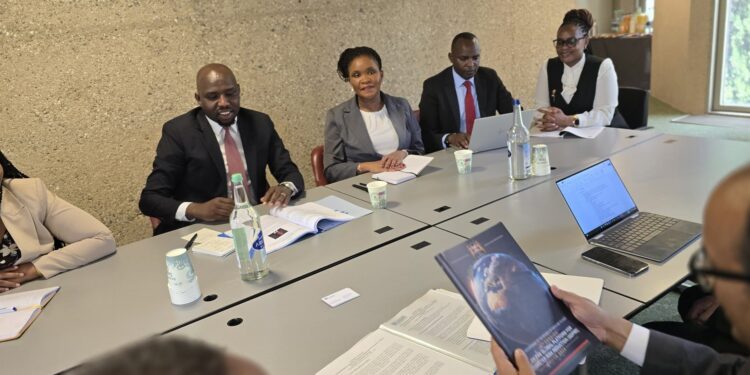Interior and National Administration Cabinet Secretary Kipchumba Murkomen, currently attending the 8th Session of the Global Platform for Disaster Risk Reduction (GP2025) in Geneva, has reaffirmed Kenya’s commitment to global cooperation on security and refugee matters. Speaking during high-level bilateral talks with United Nations officials, Murkomen emphasized Kenya’s readiness to strengthen partnerships in support of over 800,000 refugees and asylum seekers currently hosted across the country.
Murkomen’s meeting with Raouf Mazou, Assistant High Commissioner for Operations at the United Nations High Commissioner for Refugees (UNHCR), highlighted Kenya’s enduring commitment to its responsibilities as a host nation. With more than 800,000 refugees and asylum seekers residing in various camps and urban centres, Kenya continues to shoulder a critical regional role. These individuals, fleeing conflict, persecution and environmental stress, have found in Kenya a place of relative safety and emerging opportunity.
A central focus of the discussion was the Shirika Plan, a recently launched multi-stakeholder initiative that aims to integrate refugees into the broader socio-economic framework of the country. The plan supports self-reliance and resilience among displaced populations while fostering greater cohesion with host communities. For Kenya, this approach is both humanitarian and strategic. Economic integration reduces aid dependency and creates a pathway for refugees to contribute meaningfully to national development.
Kenya’s approach also reflects an advanced policy model that positions refugee inclusion as a driver of community stability and long-term peace. By empowering displaced populations and aligning their interests with those of local communities, Kenya is not only fulfilling its international obligations but also reinforcing its internal cohesion.
Murkomen further called on UNHCR to enhance its advocacy efforts for peace and conflict resolution in countries of origin. Preventing displacement by addressing the root causes remains a key pillar in Kenya’s humanitarian stance. From climate-induced instability to political conflict, the regional factors driving forced migration require solutions that go beyond borders. Kenya’s insistence on upstream interventions positions it as a vocal and credible advocate for durable peace in the Horn of Africa and beyond.
In a separate engagement, Murkomen held a bilateral meeting with Kamal Kishore, Special Representative of the Secretary-General and Head of the United Nations Office for Disaster Risk Reduction. Discussions centred on strengthening cooperation in disaster preparedness, risk mitigation, and post-disaster recovery. These talks further underscored Kenya’s proactive approach to managing domestic vulnerabilities in an increasingly unpredictable climate.
Kenya’s recent launch of the “Early Warnings for All” initiative was welcomed by Kishore as a landmark achievement in anticipatory action. This initiative, aimed at enhancing the country’s capacity to forecast and respond to disasters, aligns with international goals on risk reduction. Through technology transfer, capacity building and innovation partnerships, Kenya is scaling its ability to safeguard lives and livelihoods before crises escalate.
Murkomen also paid a courtesy call on Ambassador Fancy Too, Kenya’s Permanent Representative to the United Nations Offices in Geneva. He highlighted the strategic value of Kenya’s diplomatic mission in Geneva, established in 1995, which has enabled sustained multilateral engagement across security, humanitarian and development domains.
The Ministry of Interior and National Administration, Murkomen noted, is coordinating efforts across agencies to build a resilient national disaster management system. This multi-agency coordination ensures that disaster response is both timely and effective, supported by international cooperation and best practices.
Taken together, these engagements reflect a broader strategic alignment between Kenya’s domestic priorities and global humanitarian standards. As a country situated at the crossroads of regional migration and climate vulnerability, Kenya’s active diplomacy and innovative policy responses position it as a trusted partner in shaping solutions to some of the most urgent challenges facing the continent.
By reinforcing global partnerships, deepening refugee inclusion and investing in risk preparedness, Kenya is setting a precedent for balancing national interests with international responsibility. The benefits are both tangible and long-term, ensuring that the country remains a stabilising force in the region and a respected actor on the global stage.
Kenya’s floriculture industry is set to bloom even brighter in 2025 as flower exports are projected to surge to 110 billion Kenyan shillings, equivalent to approximately 851 million...
Read moreDetails









